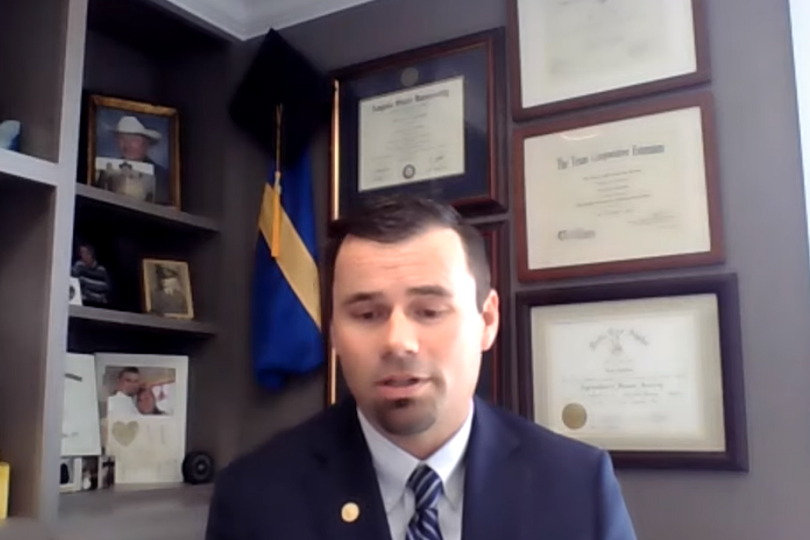By Julie Tomascik
Editor
Although rains have fallen across the Lone Star State this week, drought is a word Texans know all too well.
Dry conditions persisted across Texas for most of 2020 and well into 2021. Heavy downpours this week have brought much-needed relief to the dry, parched ground. But parts of West Texas, the Texas Panhandle and other Western states still need more moisture.
Republican members of the U.S. House Committee on Natural Resources today held a forum to examine the impacts of the growing drought situation across the West, and Texas farmer and rancher Ross Copeland shared his experiences dealing with drought. U.S. Rep. August Pfluger of San Angelo is a Republican member on the committee.
“There have been many factors over the years making it increasingly difficult to continue farming and ranching,” Copeland told the committee members. “However, severe drought is one of the largest issues we face.”
Copeland is a fifth-generation farmer and rancher from Sterling City. He and his family raise cattle and sheep and grow crops in Coke, Sterling, Scurry and San Saba counties.
He’s no stranger to cracked ground desperate for the next rain.
As part of their farm rotation, Copeland often plants winter wheat in September or October and turns cattle out on the fields to graze in late winter or early spring. But severe drought conditions forced Copeland to reevaluate that plan for the last two years.
“The worsening drought made it impossible for us to grow a wheat crop, causing major disruption to our operation. Due to this, we have been forced to buy feed for cattle and even sell some of our herd to make ends meet,” he said. “Thankfully, there are programs in the farm bill to help keep us in operation, but I want to make this clear. These programs keep us operating. They by no means make us completely whole. Regardless, we are grateful for the farm bill and have utilized these programs over the years.”
Farm bill programs like the U.S. Department of Agriculture’s Wildfire and Hurricane Indemnity Program Plus (WHIP+) help many American farmers like Copeland.
The program provides payments to farmers to offset losses from drought, hurricanes, wildfires and other qualifying natural disasters. An update in February 2020 expanded program eligibility to counties that experienced D3 and D4 drought conditions in 2018 and 2019. But expanded coverage is still needed to include the drought disasters of 2020 and 2021.
“While I would prefer to have stable markets, predictable weather and reasonable input costs to sustain our family and produce the world’s food and fiber, the reality is we must have a farm bill to achieve this goal,” he said. “When disasters, like extreme drought, occur, we must ensure supplemental assistance is provided. Extension and strengthening of the USDA Wildfire and Hurricane Indemnity Program Plus (WHIP+) is crucially needed to cover extreme weather events, such as the current drought for the 2020 and 2021 crop years.”
Texas Farm Bureau is working with other state Farm Bureaus and Congressional leaders to extend WHIP+ to cover 2020 and 2021 crop years and make improvements to the program.
“Ross Copeland represents the next generation of farmers and ranchers, and it was an honor to have him testify on behalf of the 11th District today,” Pfluger said. “Congress must immediately reauthorize the U.S. Department of Agriculture’s Wildfire Hurricane Indemnity Program Plus to cover disasters from 2020 and 2021. It is time to provide the needed relief so West Texas farmers can continue to supply the food and fiber our country depends on.”
Copeland serves as the president of Coke-Sterling County Farm Bureau and testified before the committee members on drought impacts on behalf of Texas Farm Bureau.
A California farmer and a South Dakota Stockgrowers Association representative were also among those who testified during today’s committee member forum.
The full video of the hearing on drought impacts and water can be viewed here.


[…] Click here to view original web page at texasfarmbureau.org […]